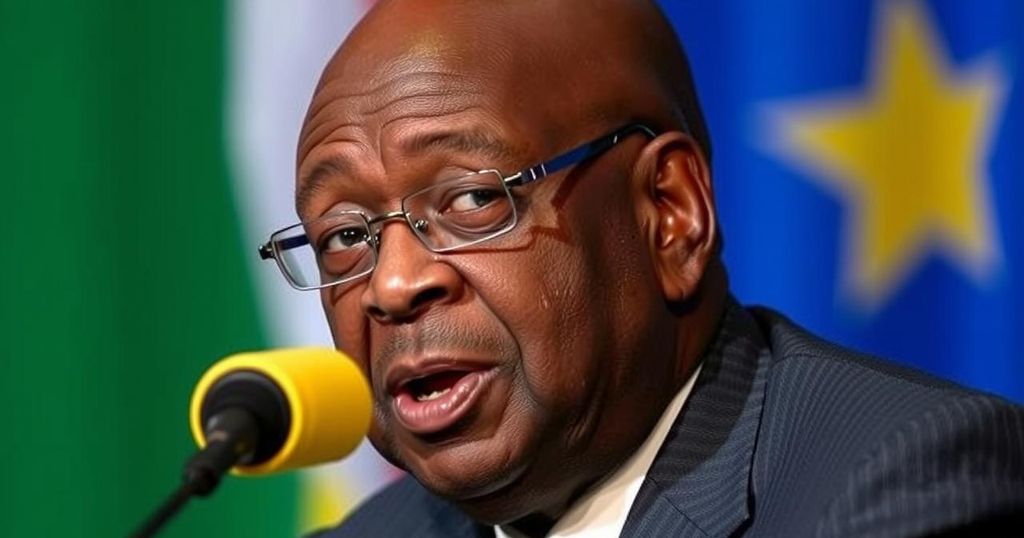Politics
AFRICA, BOKO, BOTSWANA, BOTSWANA DEMOCRATIC PARTY, BOTSWANA PATRIOTIC FRONT, BOTSWANA TELEVISION, DEMOCRACY, DU, DUMA BOKO, DUMELANG SALESHANDO, ERIC MASISI, GOVERNANCE, GOVERNMENT, IAN KHAMA, KHAMA, LEADERSHIP, MASISI, MO, MOKGWEETSI ERIC MASISI, MOZAMBIQUE, OPPOSITION, SOUTH AFRICA, UDC, UMBRELLA FOR DEMOCRATIC CHANGE
Isaac Bennett
0 Comments
Botswana’s President Masisi Accepts Defeat Following Major Electoral Loss
Botswana’s President Mokgweetsi Eric Masisi has accepted defeat as his party, the Botswana Democratic Party (BDP), lost its parliamentary majority in recent elections. With the opposition coalition winning two-thirds of the parliamentary seats, Masisi acknowledged the “massive” loss and expressed his intention to facilitate a smooth transition of power. Duma Boko, leader of the opposition Umbrella for Democratic Change, is expected to be the next president.
Mokgweetsi Eric Masisi, the President of Botswana, has publicly acknowledged the defeat of the Botswana Democratic Party (BDP) in the recent parliamentary elections, marking a significant turning point for a party that has held power since the nation gained independence in 1966. The BDP has only secured two seats in the new parliament, indicative of a sweeping electoral shift toward opposition parties, which collectively attained approximately two-thirds of the available parliamentary seats. As of early Friday morning, with several votes still being counted, it has been reported that opposition parties had won 40 out of 61 constituencies. Notably, the coalition known as the Umbrella for Democratic Change (UDC), led by Duma Boko, achieved 28 seats, whereas the Botswana Congress Party (BCP), under Dumelang Saleshando, claimed eight seats, and the Botswana Patriotic Front (BPF), associated with former President Ian Khama, secured five seats. In Botswana’s electoral system, a coalition or party must secure a minimum of 31 seats to obtain a parliamentary majority and subsequently form a government. Mr. Masisi addressed the media through a live broadcast on Botswana Television, expressing his acceptance of the election results, which he described as a “massive” loss for his party. He articulated his intention to facilitate a smooth transition of power by stating, “I will respectfully step aside and participate in a smooth transition process ahead of the inauguration.” He also reflected on his time as president, expressing a sense of fulfillment in his role despite its challenges: “I had the most interesting presidency, the most challenging … I loved my job, and I’m prepared to leave it. Thank you. God bless.” Mr. Boko, as the leader of the UDC, is anticipated to become the next president when parliament convenes to elect a new head of state. Official results are expected to be confirmed by the Independent Electoral Commission later in the day, as Botswana embarks on a new chapter in its political landscape.
Botswana has a distinct political history, characterized by the long-standing dominance of the Botswana Democratic Party (BDP), which has ruled since the country gained independence from British colonial rule in 1966. This recent election marks a pivotal change as it reveals the electorate’s shift in loyalty towards opposition parties, suggesting a potential transformation in the political dynamics of Botswana. The election system in Botswana is parliamentary, mirroring elements of the system used in South Africa, where voters select parties rather than individual candidates, subsequently allowing the winning party to appoint the government. The implications of this electoral shift may reshape governance and policies in the nation, highlighting the increasing demands of the populace for change and representation.
In conclusion, the recent parliamentary elections in Botswana signify a historical moment, as President Mokgweetsi Eric Masisi conceded defeat in a race that results indicate a catastrophic loss for the Botswana Democratic Party. The opposition’s success demonstrates a significant shift in the political landscape and the electorate’s desire for new leadership. This development not only alters the immediate governance of Botswana but also reflects broader trends regarding political participation and democratic expression within the country. As Botswana prepares for this transitional period, the opportunity for growth and reform lies ahead under new leadership.
Original Source: www.theeastafrican.co.ke




Post Comment